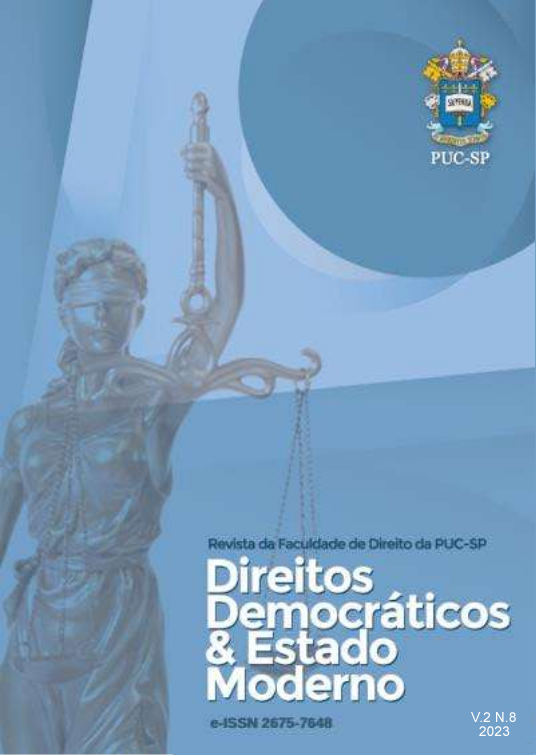The Tax on great fortunes (cf, Art. 153, VII), the principle of equality and the effectiveness of the Constitution
DOI:
https://doi.org/10.23925/ddem.v.2.n.8.63047Keywords:
Principle of Equality, Human dignity, Great Fortunes, Effectiveness of the Constitution, Economic OrderAbstract
This article deals with the principles established by the Federal Constitution to the economic order that “aims to ensure a dignified existence for all” according to art. 170, “caput”, item VII. There is an express determination that, among the principles contained therein, the reduction of regional and social inequalities be established. It is in this sense that it is important to expand inclusive or re-inclusive action to achieve a change in mentalities, leading to social cohesion already provided for in the Constitution. The research was developed using the hypothetical-deductive method of approach, the comparative procedure, the technique of indirect documentation, the bibliographical research: in books and legal periodicals; documentary; in legislation and on electronic sites.
References
ARAÚJO, Luiz Alberto David. NUNES JUNIOR, Vidal Serrano. Curso de Direito Constitucional, Verbatim, São Paulo, 2017.
BARROSO, Luís Roberto. Curso de Direito Constitucional Contemporâneo. Saraiva, São Paulo, 2011.
BASTOS, Celso Ribeiro. Curso de Direito Constitucional, Saraiva, São Paulo, 1999.
DALLARI, Dalmo de Abreu, Elementos de Teoria Geral do Estado, Saraiva, 2012.
DICIONÁRIO Básico da Língua Portuguesa Aurélio. Nova Fronteira, Rio de Janeiro, 1995.
DOWBOR, Ladislau. Bilhões são gerados sem a criação de um único emprego, in Jornal Folha de São Paulo, 19/09/2021. Disponível em: https://www1.folha.uol.com.br/mercado/2021/09/na-nova-era-do-conhecimento-bilhoes-sao-gerados-sem-a-criacao-de-um-unico-emprego-diz-economista.shtml#:~:text='Na%20nova%20era%20do%20conhecimento,09%2F2021%20%2D%20Mercado%20%2D%20Folha. Acesso em 02/08/2023.
EDITORIAL do Jornal O Estado de S. Paulo, 17/08/2019.
ENCICLOPÉDIA Larousse Cultural. Ed. Nova Cultural, Rio de Janeiro, 1998.
FERRAZ FILHO, José Francisco Cunha. Constituição Federal Interpretada, Manole, São Paulo, 2012.
GALZA, Wesley. STF julga se Congresso se omitiu sobre fortunas, in Jornal o Estado de São Paulo, 25/06/2021. Disponível em: https://www2.senado.leg.br/bdsf/handle/id/640222. Acesso em 02/08/2023.
HESSE, Konrad. Escritos de Derecho Constitucional. Centro de Estúdios Constitucionales, Madrid, 1983.
MING, Celso. Ideia que vem e volta: o imposto sobre grandes fortunas, in Jornal O Estado de São Paulo, 31/01/2021. Disponível em: https://sindeprestem.com.br/ideia-que-vem-e-volta-o-imposto-sobre-grandes-fortunas-celso-ming/. Acesso em 02/08/2023.
NOBREGA, Mailson da. O encanto de taxar fortunas, in Revista Veja, 31/03/2021. Disponível em: https://veja.abril.com.br/coluna/mailson-da-nobrega/o-encanto-de-taxar-fortunas. Acesso em 02/08/2023.
PIKETTY, Thomas. A Economia da Desigualdade. Ed. Intrínseca, Rio de Janeiro, 2015.
RACY, Sonia, Direto da fonte, in Jornal Folha de São Paulo, 18/06/2021.
REGO, Alexandre. Constituição Federal Interpretada, Comentários ao Sistema Constitucional Tributário, in: MACHADO, Antonio Cláudio da Costa (Org.). Constituição Federal Interpretada. 1ed. São Paulo: Manole, 2010, v. 1.
ROCHA, Flavio. Taxar grandes fortunas reduz desigualdade, mas empobrece os ricos, in Jornal Folha de São Paulo, 18/07/2021. Disponível em: https://www.poder360.com.br/economia/taxar-fortunas-reduz-desigualdade-mas-ricos-deixarao-brasil-diz-flavio-rocha/. Acesso em 02/08/2023.
SILVA, José Afonso da. Comentário contextual à Constituição, Malheiros, São Paulo, 2005.
SILVA, José Afonso da. Curso de Direito Constitucional Positivo, Malheiros, 2006.
SOUTO, Marcos Juruena Villela. Ordem econômica na Constituição, in. Revista Brasileira de Finanças Públicas, 2011.
TEIXEIRA, Antonio José da Silva, Os Apóstolos (Typographia), Porto, 1866.
Downloads
Published
How to Cite
Issue
Section
License
Copyright (c) 2023 Democratic Rights & Modern State

This work is licensed under a Creative Commons Attribution 4.0 International License.
This work is licensed under a License Creative Commons Atribuição 4.0 Internacional.
The authors grant the journal all copyrights relating to the published works. The concepts issued in signed articles are the absolute and exclusive responsibility of their authors.
DD&EM Magazine - ISSN 2675-7648

















